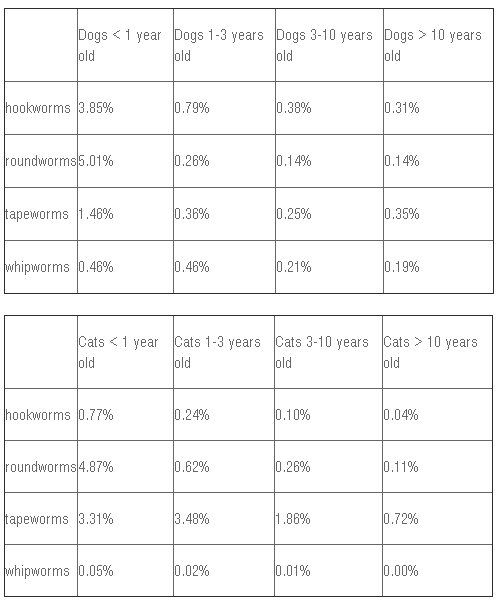|
Why so many fecal exams? Because intestinal parasites are quite common in pet dogs and cats. Every year Banfield Pet Hospitals compiles a report based on the medical records of the patients they see. In 2013 they performed fecal examinations on 2,594,599 canine samples and 319,535 feline samples. Here are the percentage of tests that were positive broken down by age and type of parasite found. At first glance, these numbers may not look all that impressive, but digging a little deeper reveals a different story. Let’s look at the puppy and kitten numbers as examples since this is the age group most at risk for intestinal parasitism. What’s missing is the percentage of fecal samples that were positive for any type of intestinal parasite. Adding up the numbers in the columns above gives us a total of 10.78% for puppies and 9% for kittens. These percentages may not be exact since I’m sure some samples were positive for more than one type of parasite, but they give us a ball park figure.
However, a couple of issues suggest that these estimates are actually too low. First of all, whipworms are notoriously hard to diagnose via fecal exam. Their eggs don’t float very well in the most commonly used type of solution, and the worms release their eggs on an intermittent basis (in other words, the worms are present but their eggs are not). Secondly, while hookworms, roundworms, tapeworms, and whipworms are the “Big Four,” these tables say nothing about the incidence of Giardia, coccidia, and other types of intestinal parasites that can affect dogs and cats. The incidence of parasitism in pets is probably significantly higher than what the Banfield numbers show. In fact, a study published in 2009 looking at over a million canine fecal samples submitted to Antech Diagnostics revealed that 29.6% of those coming from dogs less than six months of age and were positive for intestinal parasites. Wow! So next time you head to the veterinary clinic, make sure you bring along a sample of your pet’s poop. You might be surprised at what’s hiding inside.
0 Comments
Leave a Reply. |
The PAW Blog...
For the LOVE of Pets The goal of this blog is to help educate pet owners by sharing pet health facts and pet news articles...and ... sometimes put a smile on your face with a cute or funny pet story! Categories
All
Archives
July 2024
Search for any topic...
|


 RSS Feed
RSS Feed

